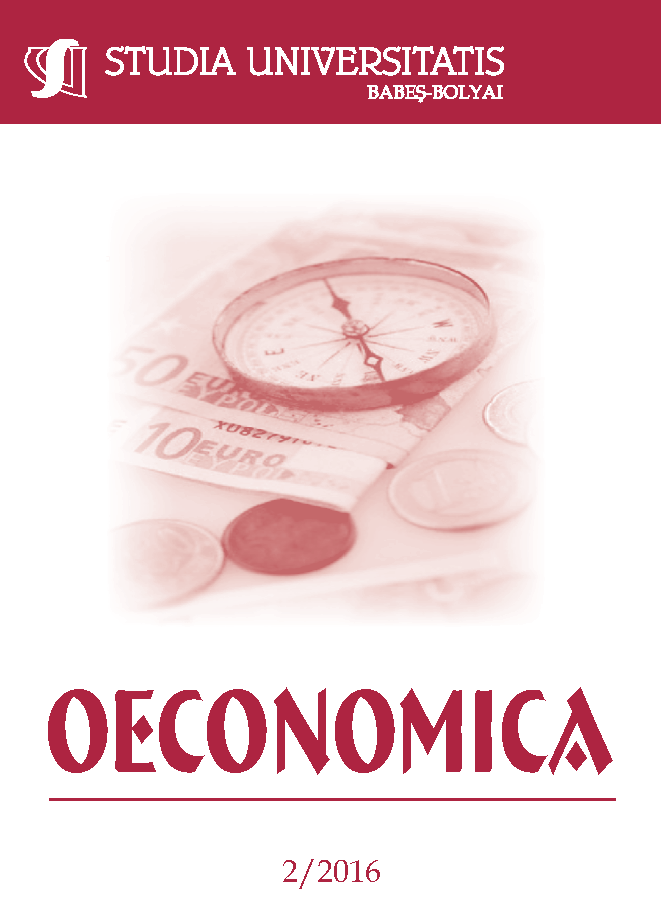“CONDEMNED TO HAPPINESS”... A COMPARISON IN TERMS OF TAX COMPLIANCE AND HAPPINESS WITHIN THE EUROPEAN UNION
Keywords:
ax compliance, happiness, life satisfaction, well-being, ecological footprintAbstract
Analysing the tax compliance is a difficult task, considered to have mainly an economic dimension. Happiness, an unconventional factor when explaining economic phenomena, can bring however, interesting insights, as well. This paper focuses on the relationship between tax compliance and happiness in EU former communist countries and other 17 EU countries, before the last EU enlargement in 2013. The findings show that the countries with the highest degree of tax compliance have also a large ecological footprint. The happier EU countries are also the countries where tax compliance records the highest level and those that have a history of democratic systems.
JEL Classification: H260, I310
References
Akay, A., Bargain, O., Dolls, M., Neumann, D., Peichl, A., Siegloch, S., (2012). Happy Taxpayers? Income Taxation and Well-Being, Institute for the Study of Labour (IZA) Bonn, Discussion paper no. 6999. Available online: http://ftp.iza.org/dp6999.pdf, Retrieved: July 26, 2016.
Blanchflower, D.G. (2008). Happiness economics, NBER Reporter Online, National Bureau of Economic Research (NBER), Cambridge, Mass., Issue no. 2, pp. 7-10.
Easterlin, R., (1974), Does economic growth improve the human lot? Some empirical evidence. In: David, P.A. and Reder, M.W., (eds.), Nations and Households in Economic Growth: Essays in Honour of Moses Abramowitz, New York and London, Academic Press, p. 89-125.
Etzioni, A., 2016. Happiness is the Wrong Metric, Soc (2016) 53:246–257, DOI 10.1007/s12115-016-0008-6.
Ewing B., A. Reed, A. Galli, J. Kitzes, Wackernagel, M., (2010), Calculation Methodology for the National Footprint Accounts, 2010 Edition, Oakland: Global Footprint Network.
Frey, B. S., Stutzer, A., (2007). Happiness and Economics. Economics and Psychology, A promising new cross-disciplinary field, MIT Press, Cambridge, Massachusetts, London, England, ISBN 978-0-262-06263-3.
Gintis, H., Henrich, J., Bowles, S., Boyd, R., Fehr, E., (2008). Strong reciprocity and the roots of human morality. Social Justice Research 21, 241–253.
Graham, C., (2005). The Economics of Happiness Insights on globalization from a novel approach, World Economics, Vol.6, No. 3, July-September 2005.
Hagerty, M.R., Veenhoven, R., (2003), Wealth And Happiness Revisited Growing wealth of nations does go with greater happiness, Social Indicators Research, vol. 64, p. 1-27.
Inglehart, Ronald F., R. Foa, C. Peterson, Welzel, C., (2008), Development, Freedom, and Rising Happiness A Global Perspective (1981-2007), Perspectives on Psychological Science, 3(4): 264-285.
Kelman, H., (1965), Manipulation of Human Behaviour: An Ethical Dilemma for the Social Scientist, Journal of Social Issues. 21: 31-46.
Kenny, C., (1999), Does Growth Cause Happiness, or Does Happiness Cause Growth?, Kyklos 52(1), p. 3–26.
Kirchler, E., Muehlbacher, S., Kastlunger, B.,Wahl, I., (2007), Why Pay Taxes? A Review of Tax Compliance Decisions, [Online] at http://aysps.gsu.edu/isp/files/ispwp0730.pdf, Accessed: 20th May 2016.
Lovinescu, M., (2008). Etica neuitării, Humanitas Publishing, Bucharest.
Lubian, D., Zarri, L., 2011. Happiness and Tax Morale: an Empirical Analysis, Journal of Economic Behaviour & Organization September 2011, DOI: 10.1016/j.jebo.2011.03.009
Markusen, A., (2003), Fuzzy Concepts, Scanty Evidence, Policy Distance: The Case for Rigour and Policy Relevance in Critical Regional Studies, In: Regional Studies, Volume 37, Edition 6-7, p. 701-717.
Ng, Y., Ho, L.S., (2006), Introduction: Happiness as the only ultimate objective of public policy, in Happiness and Public Policy: Theory, Case Studies and Implications, eds. Yew - Kwang Ng and Lok Sang Ho, Palgrave Macmillan, Basingstoke UK, p. 1-16.
Norberg, J., (2005), The scientists’ pursuit of happiness, Policy (21), 9–13.
Oswald, A., (2006), The Hippies Were Right all Along about Happiness, Article published in the Financial Times, Available online: http://www.andrewoswald.com/docs/fthappinessjan96.pdf, Accessed: 20th May 2016.
Smith, A., 1776. An inquiry into the Nature and Causes of the Wealth of Nations, Metalibri, 2007, Available online: http://www.ibiblio.org/ml/libri/s/SmithA_WealthNations_p.pdf, Accessed: 01st 2016.
Stutzer, A., Frey, B., (2012). Recent Developments in the Economics of Happiness: A Selective Overview, Institute for the Study of Labour (IZA) Bonn, Discussion Paper no. 7078, Available online: http://ftp.iza.org/dp7078.pdf, Retrieved: July 26th, 2016.
Vogel, J., (1974), Taxation and public opinion in Sweden: An interpretation of recent survey data, National Tax Journal, 27(1), 499–513.
*** Eurobarometer, http://ec.europa.eu/public_opinion/index_en.htm, Accessed: 30th May 2016.
*** OECD, Understanding and Influencing Taxpayers’ Compliance Behaviour, Available online at: http://www.oecd.org/tax/administration/46274793.pdf, Accessed: 30th May 2016.
*** PwC Paying Taxes Report, 2013, PwC & World Bank/IFC
*** The 1776 Declaration of Independence, transcript available online: http://www.archives.gov/exhibits/charters/declaration_transcript.html, Accessed: 30th May 2016.
*** The Happy Planet Index: 2012 Report – A global index of sustainable well-being, Available online: http://www.happyplanetindex.org/assets/happy-planet-index-report.pdf, Accessed: 30th May 2016.
*** World Values Survey, http://www.worldvaluessurvey.org/wvs.jsp, Accessed: 30th May 2016.
Published
How to Cite
Issue
Section
License
Copyright (c) 2016 Studia Universitatis Babeș-Bolyai Oeconomica

This work is licensed under a Creative Commons Attribution-NonCommercial-NoDerivatives 4.0 International License.






